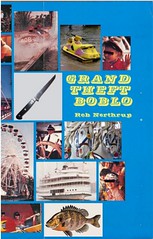Sci-Fi: I don't think that word means what you think it means
Do you have a rough idea of how you'd define science fiction?
Good, then I'll take it for granted we both have the same idea in mind. There are a few people who have something different in mind, and unfortunately they're fairly famous and influential.
Cory Doctorow: "In his new novel Spook Country, William Gibson take science fiction to an amazing, unseen world: the recent past. ... These characters inhabit the exciting, futuristic world of 2006. And it is a futuristic place, our recent past, a place so weird and light-speed that we don't even notice it. Not until a master storyteller and keen observer like William Gibson comes along to show us what we're all living in." Spook Country was published in 2007, and Doctorow's post about it was from 31 July 2007.
"Bleak House is a quintessential Victorian text, but it is also probably the best steam-punk landscape that will ever be. Dickens really nailed it, especially in those proto-Ballardian passages in which everything in nature has been damaged by heavy industry. But there were relatively few voices like Dickens then. Most people thought the progress of industry was all very exciting. Only a few were saying, Hang on, we think the birds are dying."
Gibson interviewed in the Summer 2011 Paris Review
Margaret Atwood: the road to Ustopia
"The author of The Handmaid's Tale has been criticised for not wanting to call her books science fiction. But what is SF anyway, and how does it connect with her lifelong fascination with creating other worlds?"
Instead of saying that some sci fi is good and some is bad, or that some is plausible while some is not, she wants to reserve the term "science fiction" for "fiction in which things happen that are not possible today". If you find her novels plausible or convincing or possible like she does, then she can escape from the ghetto of science fiction. The term she prefers is "speculative fiction", meaning "things that really could happen but just hadn't completely happened when the authors wrote the books."
No matter that the rest of the world uses the term "science fiction" (synonymously with speculative or extrapolative fiction), Atwood will hold tightly to a different meaning, and pretend that the rest of us are being uptight when we try to remind her what the term commonly means.
Neal Stephenson had made some statement in an interview saying that Cryptonomicon and his Baroque Cycle could be classified as science fiction because they explore ideas that sci fi fans would enjoy. It annoyed me at the time, but looking back for those quotes, he seems to be qualifying the statements a lot, not necessarily stretching the definition of sci fi.
Good, then I'll take it for granted we both have the same idea in mind. There are a few people who have something different in mind, and unfortunately they're fairly famous and influential.
Cory Doctorow: "In his new novel Spook Country, William Gibson take science fiction to an amazing, unseen world: the recent past. ... These characters inhabit the exciting, futuristic world of 2006. And it is a futuristic place, our recent past, a place so weird and light-speed that we don't even notice it. Not until a master storyteller and keen observer like William Gibson comes along to show us what we're all living in." Spook Country was published in 2007, and Doctorow's post about it was from 31 July 2007.
"Bleak House is a quintessential Victorian text, but it is also probably the best steam-punk landscape that will ever be. Dickens really nailed it, especially in those proto-Ballardian passages in which everything in nature has been damaged by heavy industry. But there were relatively few voices like Dickens then. Most people thought the progress of industry was all very exciting. Only a few were saying, Hang on, we think the birds are dying."
Gibson interviewed in the Summer 2011 Paris Review
Margaret Atwood: the road to Ustopia
"The author of The Handmaid's Tale has been criticised for not wanting to call her books science fiction. But what is SF anyway, and how does it connect with her lifelong fascination with creating other worlds?"
Instead of saying that some sci fi is good and some is bad, or that some is plausible while some is not, she wants to reserve the term "science fiction" for "fiction in which things happen that are not possible today". If you find her novels plausible or convincing or possible like she does, then she can escape from the ghetto of science fiction. The term she prefers is "speculative fiction", meaning "things that really could happen but just hadn't completely happened when the authors wrote the books."
No matter that the rest of the world uses the term "science fiction" (synonymously with speculative or extrapolative fiction), Atwood will hold tightly to a different meaning, and pretend that the rest of us are being uptight when we try to remind her what the term commonly means.
Neal Stephenson had made some statement in an interview saying that Cryptonomicon and his Baroque Cycle could be classified as science fiction because they explore ideas that sci fi fans would enjoy. It annoyed me at the time, but looking back for those quotes, he seems to be qualifying the statements a lot, not necessarily stretching the definition of sci fi.







0 Comments:
Post a Comment
Subscribe to Post Comments [Atom]
<< Home